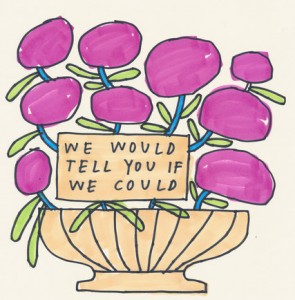Here’s a new “must read” for people with a grim prognosis, submitted by Twitter friend @Scanman (Vijay Sadasivam), from the Tamil region of India: How Long Have I Got Left?, by Stanford neurosurgeon Paul Kalanithi.
Seven years ago that was my situation. This was the week that a biopsy confirmed that the blobs in my lungs were metastasized kidney cancer, and what I read was “bleak,” “grim,” and lovely words like that. It’s the kind of experience you don’t forget.
This compelling essay in the New York Times Sunday Review recounts all the things newly diagnosed patients go through, and the doctor’s side of it – how to manage the relationship, and in particular how he and his oncologist interacted. One vital takeaway for me:
- We all want certainty
- There is no certainty.
Early in my illness my sister who’d worked in the AIDS epidemic taught me that there’s no one way to deal with it. Different people have different needs. One of your many tasks is to learn how you (singular and plural) will deal with it.
These lines in particular stick with me, from the library of advice he often gives patients:
- “illness can drive a family apart or bring it together — be aware of each other’s needs and find extra support.”
- “five-year survival curves are at least five years out of date.”
In a sense, the patient and family and clinician in this soup are walking a cliffside trail in the dark. For me the corker is a line he quotes from Samuel Beckett:
“I can’t go on. I’ll go on.”







Other items in Kalanithi’s wonderful essay:
(You do see that those two are the same, right? And can you sense the difference in your own non-arithmetic gut reaction to the two statements? The difference may be an illusion, but as we said in 2012, illusions can be powerful even when you know they’re illusions.)
I’ll add that in the very first days after I joined my patient community, someone said something I often quote: “If you don’t want to die of kidney cancer, the game is to live long enough to die of something else!”
An important extension of that is that if you manage to live a while longer, who knows, something new may come along. In Kalanithi’s case that happened to be a new drug.
NONE OF THIS GUARANTEES ANYTHING. There is no certainty. But as he says, always leave room for some hope.
About hope – a word, concept, topic that seems a trigger for all kinds of judgment, emotions, and interpretations. Working on various Palliative Care Initiatives, I see hope can be framed according to the health state/state of health. For Dr. Kalanithi, for eg, hope can be focused on what’s possible – increasing energy and mobility. This is not mutually exclusive to a hope – however ‘faint’- for a cure in his lifetime.
Kathy, there aren’t many things I’m pretty certain about, but I bet one is this:
When someone’s experienced the prospect of NO hope, I bet they’re not too choosey about what KIND of hope rides over the horizon and lightens their outlook.
In my experience, as soon as there’s no hope, doors seem to close. There’s nothing much left in this life to plan for.
I should write more about this.. it was part of my tiny second book, “Facing Death – With Hope.”
Thanks Dave for the reminder..I don’t anyone and self included who really fully understand until like you said you have had such an experience, but we can learn by listening to you and others that remind us of how precious life really is…good stuff!
A letter to the editor the next day (1/27) expressed this well:
The Prognosis Is Grim, but I’m Living My Life.
“I am also young and healthy and five months out from a diagnosis of terminal lung cancer. At first I could articulate no hope; it was foolish and futile, according to the actuaries. Now, after chemotherapy that was supposed to be only palliative, I make appointments with students and patients, accept book contracts, dream of my children’s futures and run on the treadmill while listening to Sinatra belt out “The Best Is Yet to Come.”….” [Continued]
I suspect this is the perspective the Kellers missed when they failed to understand Lisa B. Adams’s approach to her life.
(They also flunked what social media is about, but that’s a separate matter.)